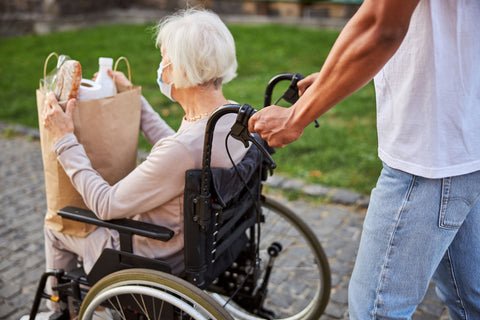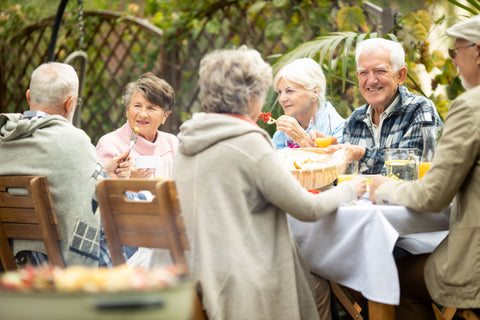Colder, darker weather makes winter more challenging for everyone. However, the winter months also bring many people happiness and joy at Christmas. But not everyone feels the same way, especially older adults who may have lost a partner or if they live far away from their children and family.
According to Age UK, almost 1.5 million older adults feel more lonely at Christmas than at any other time of the year. Out of those, two-fifths are alone after their spouse has passed away.
Many older adults rely on public places and groups for social interaction, such as their local community centre or library. Many of these are closed over Christmas, leading to social isolation for those who rely on their daily visits to these spots.
Being a carer for an older adult can seem like a massive task during the Christmas holiday, especially if you belong to the sandwich generation, caring for your children as well. But sometimes, even the smallest gestures can make a huge difference in your elderly parent's life. So this Christmas season spread some festive cheer in the life of your elderly loved one by following the tips below.
How can you help older loved ones during Christmas?

Offer a listening ear
Many older adults who live alone can go days without speaking to anyone, leading to loneliness and social isolation. You can help by actively listening when a relative or a loved one discusses or shares their feelings with you, even if they are negative. Having an honest and empathetic discussion can help them process their emotions, whether they are going through a loss or coming to terms with new health challenges. Whether just for an hour over a cup of tea or a quick phone catch-up, offering an elderly loved one your time and company over Christmas might make their day.
Help them with their everyday errands
Spending some time helping your older loved ones with tasks around the home, such as taking the rubbish out, doing the dishes, or cleaning, can be a big help. You might be surprised about how positive they can feel about your companionship. If your older loved one has lost their mobility, you can help them with something as simple as a quick trip out to help with grocery shopping or a few hours visiting the Christmas markets and seeing the festive decorations around town.
Help them with Christmas decorations

A lovely way to spread joyful vibes is by proposing to help put up the Christmas decoration and remembering to offer to take them down after the holiday season. You could also turn it into a fun activity after Christmas by making it a meet-over-lunch day. You could offer to help with the Christmas cards and put their Christmas cards up around the house. However, make sure to plan the day with them before you decide to do anything for them on Christmas, as for some people, it could be emotional to spend Christmas without their lost loved ones.
Take the time to connect
If you cannot physically visit a family member, arrange a call instead. A simple phone or video call during the Christmas season can make a big difference and help them feel remembered. During your call, remind them that they are an important part of your life and you miss them during holiday celebrations. They might only feel worthy if they are able to contribute to the festivities like old times, so explain to them that they are important and encourage them to contribute in the best way possible.
Find a Christmas event near their home

If you are unable to visit them in person, another option is to find a Christmas event near their home. If they are feeling fit and healthy, you can encourage them to attend a church event, community centre or other local activity. Charities like Age UK organise activities for older adults around Christmas, so you could let your elderly loved one know about them and help them make arrangements to go.
Help them cope with loneliness using digital technology
Not everyone in their later years can use tech devices; if your elderly loved one struggles with using the internet or social media, it can make them feel cut off from those who can more easily participate in chat groups and video calls. While you were around them, it might feel more manageable to be shown how to make an audio or video call on a smartphone or tablet, only for them to forget what to do when you're not there to help or talk them through it. A more productive way to help with this is to write instructions down so that your older loved one can refer back to them later, and some smart devices could also help.
Additional peace of mind with a personal alarm
Getting a personal alarm can provide peace of mind to you and your loved one not only during the Christmas season but throughout the year. For example, if your older loved one has a fall or any other emergency, they can call for help with a single push of a button, alerting the 24-hour monitoring team.
At TakingCare, we have various personal alarms with multiple features and functions, so your loved one can choose the one most suited to their circumstances.
- A fall detector will automatically detect if your relative has a fall in the home or garden and raise an alert.
- A GPS personal alarm is convenient if they spend lots of time out and about - it works anywhere and can give the response team your loved one's GPS location if needed.
Have a look at the full range of TakingCare personal alarms.
Your loved one don't have to endure the burden of feeling socially isolated alone. Support is available to help them cope with the adverse effects of social isolation.
Staying Connected guide
Our Staying Connected guide includes tips to cope with loneliness after retirement. Click here to download the Staying Connected guide for free.



